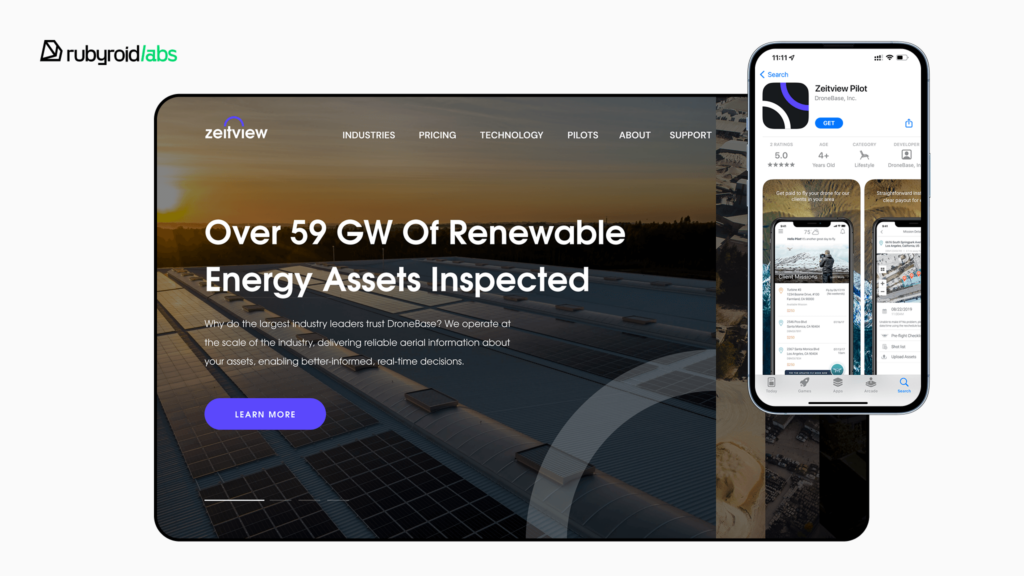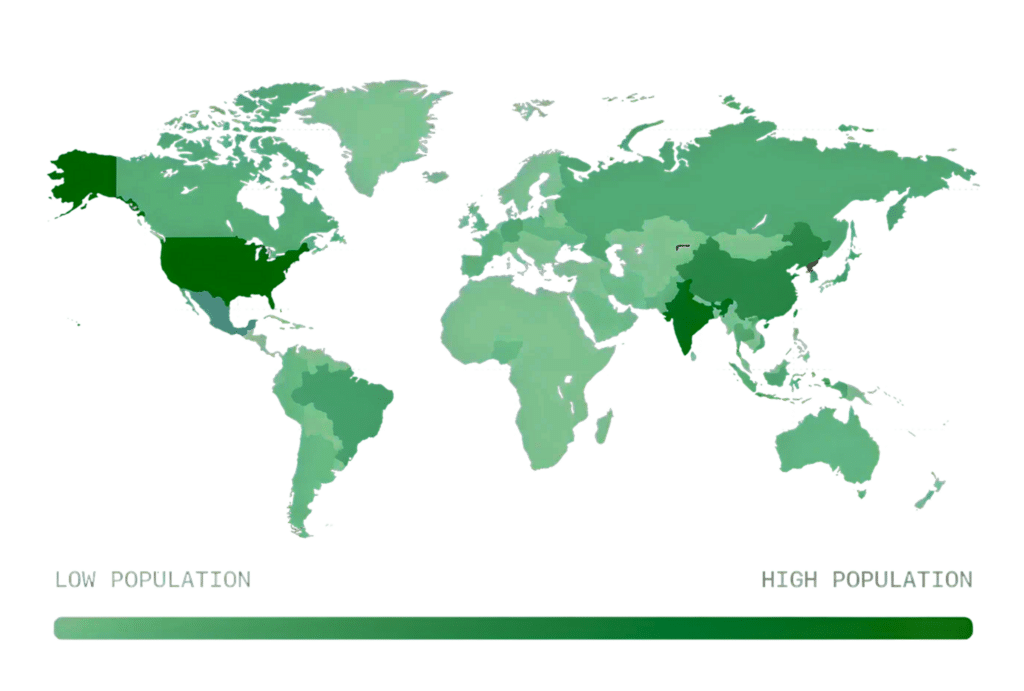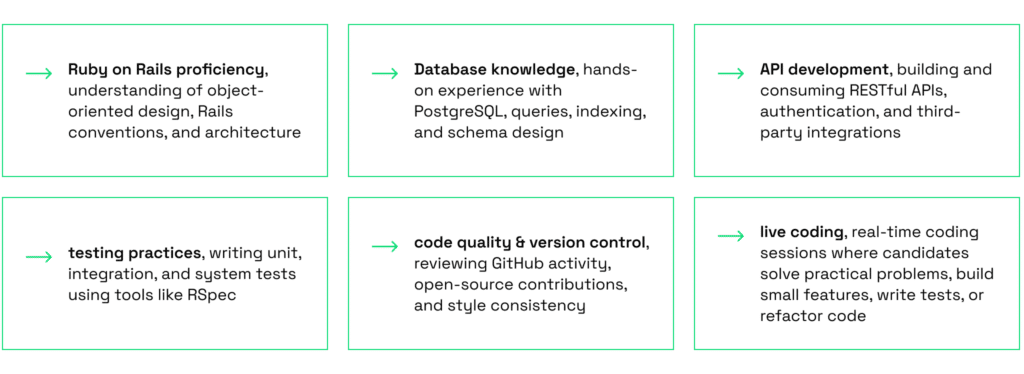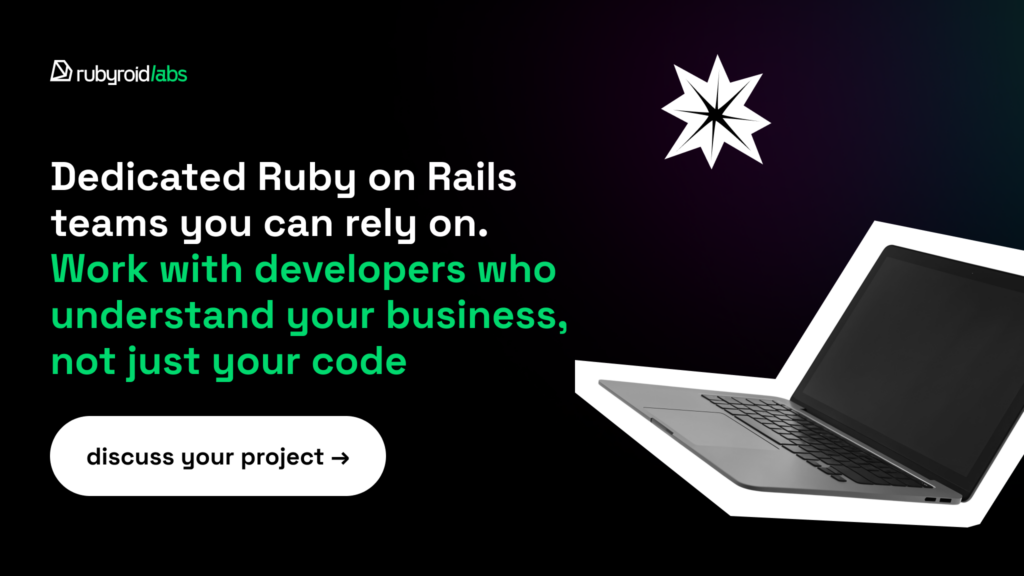What’s one powerful, reliable, and battle-tested framework that startups continue to trust for scaling their apps? The answer is Ruby on Rails.
After 12 years building Rails applications, we’ve grown more confident than ever in our choice despite the rise of newer, trendier frameworks. Rails is different. It’s a respected classic in the developer community, quietly evolving with its own steady RoR updates and trends that keep apps secure, intelligent, and polished.
However, building robust, long-lasting Rails applications requires talented developers, and finding them isn’t always easy.
As a top-five Ruby on Rails development company on Clutch, we already know how to identify exceptional Rails developers and want to share our expertise with you.
By the end of this post, you’ll learn exactly where to hire Ruby on Rails developer talent, how to test their abilities, and what to watch out for before making a hire. Let’s jump in.
Contents
- From Idea to App: What You Can Build With Rails
- What Makes Hiring Ruby on Rails Developers Difficult in 2025-2026
- Best Platforms to Find Ruby on Rails Developers for Hire
- How to Evaluate a Developer’s RoR Skills and Experience
- Key Points to Keep in Mind When Hiring Ruby on Rails Programmers
- Wrapping Up
From Idea to App: What You Can Build with Rails
All development work needs a well-matched technology setup.
Java works great for enterprise applications but feels heavy for simple websites. React excels for interactive interfaces but can be overkill for basic admin panels. Python is powerful for data processing but struggles with complex front-end work.
Rails might not be your first choice for game development or mobile-native apps, but it’s particularly well-suited for web platforms, SaaS applications, online marketplaces, and content-focused sites. It’s designed specifically for these types of projects.
If you’d like to dive deeper into Rails’ main advantages, specific use cases, and how it compares to other popular frameworks, check out our detailed article on when and why to choose Ruby on Rails for your project.
Now, let’s take a quick look at the types of projects where Rails truly shines.
SaaS (Software as a Service) Platforms
Ruby on Rails simplifies SaaS and subscription software development, naturally handling multi-tenancy, authentication, payments, billing, and continuous feature updates.
For example, Rails powers key features at Zeitview (formerly DroneBase), a major player in drone inspections and aerial analytics. The company uses the framework to run its account systems, process data, and handle subscription services.

MVPs and Startups
Rails greatly helps startups launch their first products. Its simple, convention-based approach cuts development time and accelerates delivery, perfect for founders seeking quick validation without major upfront investment.
GitHub began as a Rails app and rapidly scaled thanks to the framework’s productivity. Today, it’s the top global platform for code hosting and developer collaboration.
Social Networking and Community Platforms
Rails excels for social networking and community apps focused on user interaction and content sharing. Its database relationship management, rapid prototyping, and flexible authentication perfectly match these needs.
Dribbble, the go-to platform where designers showcase their work, runs on Rails. The framework handles everything from user interactions to content management across this thriving creative network.
Content Management and Publishing Platforms
Rails is ideal for content-heavy applications like blogs, news sites, and media platforms. Its routing, templating, and database features streamline content management and frequent updates.
Ruby on Rails efficiently powers extensive messaging and content management features in Basecamp, the widely used project management platform.
E-commerce and Marketplaces
Rails accelerates e-commerce marketplace creation through built-in tools for secure transactions, customer accounts, and sales workflow management.
The online store Yelz demonstrates Rails at work in e-commerce. Built on this framework, the platform smoothly handles all essential shop functions, from displaying products to processing orders and managing user accounts.

Companies keep choosing Ruby on Rails because it works reliably, has strong community support, and handles busy websites well. It’s still one of the most trusted frameworks for building modern web applications.
But creating a solid, long-lasting product takes more than just coding skills. You need experienced Rails developers who really understand how to design systems, meet business needs, and satisfy users, plus they need to communicate well with everyone on the project.
Hunting for these quality developers can be challenging, so hiring great Rails talent requires a strategic approach that involves overcoming obstacles and identifying top talent.

What Makes Hiring Ruby on Rails Developers Difficult in 2025-2026
The talent pool of Ruby on Rails developers for hire has grown narrower and more competitive, as experienced programmers often advance into leadership roles or shift toward other technologies. This means finding skilled mid-level or senior engineers with current Rails expertise can be surprisingly difficult.
Below, we outline some of the common challenges we face when searching for Ruby on Rails developers for hire.

Shrinking Talent Pool
In addition to the general shortage of skilled IT talent, the situation within the Ruby on Rails ecosystem is particularly challenging.
With the rise and popularity of newer languages and frameworks, fewer developers are choosing Rails as their primary skillset. While the existing Rails community remains experienced and dedicated, attracting new developers to the framework has become increasingly difficult.
Our advice:
Don’t limit your hiring to just Rails experience. Developers with strong fundamentals and good problem-solving skills can easily pick it up. If they’re familiar with similar tech, support or training can make them great RoR developers in no time.
High Competition for Skilled Developers
Experienced Ruby on Rails developers remain in high demand, especially those who bring full-stack capabilities, excellent product sense, and the ability to work independently. Startups and large corporations alike often compete fiercely for this limited pool of elite Rails talent.
Our advice:
Set your company apart by offering remote flexibility, engaging projects, and clear paths for growth. A streamlined hiring process is also essential. The faster you move, the less likely you are to lose top talent to quicker competitors.
Cost Savings vs. Developer Quality
Some companies aim to minimize costs by hiring freelancers or offshore developers, but this can sometimes result in lower-quality code, miscommunication, or delays.
Our advice:
Aim for a balance between cost and quality. Rather than simply choosing the lowest-priced developer, prioritize long-term value. Look to vetted platforms or specialized agencies experienced in providing reliable Ruby on Rails talent.
Geographic and Time Zone Differences
Even though remote work is now standard practice, working across multiple regions and time zones can remain difficult, particularly for agile teams that depend heavily on instant communication and rapid iteration cycles.
Our advice:
Define your preferred time zone overlaps clearly from the start. Use asynchronous communication tools to bridge gaps and reduce dependency on live meetings.
Hiring Ruby on Rails developers in 2025 is no longer a straightforward task. It requires clarity, flexibility and a deep understanding of the current talent situation.
If you need to hire Rails programmers, our expertise is at your service. Whether you have a new project idea or an existing application that needs review and updates, contact us for a free estimate with detailed calculations.

Best Platforms to Find Ruby on Rails Developers for Hire
As we’ve seen, finding great Rails developers isn’t always easy, but with the right approach, you can tap into a global pool of experienced talent.
In our interview with the Head of HR, we covered the best hiring strategies for you as a project owner, the platforms we use, and the developer qualities that matter most.
Here’s a quick overview of the best platforms for hiring developers, grouped by category.
Recommended Hiring Platforms for Ruby on Rails Developers (2025):
| Category | Platform | Key Features & Benefits | Best for |
| Freelance Platforms | Toptal | Pre-vetted, top-tier Rails developers (top 3%) | High-quality freelance projects |
| Upwork | Extensive talent pool, verified reviews | Diverse freelance talent | |
| PeoplePerHour | Curated selection of freelance professionals | Short-term & hourly projects | |
| Developer Marketplaces | Gun.io | Professionally vetted freelancers, matched to projects | Reliable, experienced devs |
| X-Team | Remote, long-term dedicated Rails development teams | Long-term engagements | |
| Arc.dev | Curated global network, remote Rails specialists | Remote & freelance hires | |
| Tech Hiring Platforms | Advanced search, broad talent base | Full-time positions | |
| Wellfound (AngelList Talent) | Startup-focused candidates | Startup environment | |
| Hired | Platform matching active candidates & companies | Permanent/full-time roles | |
| We Work Remotely | Popular remote-focused job board | Remote-focused hires |
Global Outsourcing Destinations for Ruby on Rails Developers
Besides traditional hiring platforms, many businesses explore global outsourcing locations to find skilled Ruby on Rails developers with strong technical abilities, competitive rates, and dependable work ethics. Here are some top regions to consider.

1. North America (United States, Canada)
Mature and advanced tech ecosystem, home to top-tier talent pools and technology hubs.
Pluses:
– High-level expertise, comprehensive education in tech
– Seamless communication, cultural alignment
– Excellent infrastructure and business environment
Minuses:
– Highest rates globally
– Intense competition for talent
2. South America (Brazil, Argentina, Colombia)
Rapidly growing tech scenes with strong developer communities, especially in Brazil and Argentina.
Pluses:
– Convenient time zones (especially for North America)
– Competitive pricing
– Good English proficiency, improving rapidly
Minuses:
– Infrastructure and connectivity can vary across countries and regions
3. Western Europe (UK, Germany, France, Netherlands, Scandinavia)
Highly skilled, experienced developers within mature and stable technology hubs.
Pluses:
– Excellent education, advanced technical skills
– Strong English language skills
– Cultural compatibility and reliable infrastructure
Minuses:
– Relatively high cost compared to Eastern Europe, Asia, South America
4. Eastern Europe (Poland, Lithuania, Romania, Bulgaria)
Popular outsourcing destination known for well-educated, experienced software developers.
Pluses:
– High-quality technical education and strong Rails expertise
– Proficient English speakers
– Competitive pricing and high work standards
Minuses:
– Time zone differences with North America can impact real-time collaboration
5. South Asia (India, Pakistan, Bangladesh)
Massive talent pool; globally recognized IT outsourcing hubs.
Pluses:
– Largest talent pools, cost-effective
– Extensive experience with global clients
– Established remote working culture
Minuses:
– Significant time-zone difference with North America
– Quality may vary; careful vetting required
Choosing the right place to outsource Ruby on Rails developers really comes down to what matters most to you:
- saving costs
- aligning time zones
- ensuring smooth communication
- relying on solid infrastructure
Understanding what each region has to offer helps you make a smart, strategic decision that fits your project’s unique needs.
Now, let’s pass to some practice and explore how to effectively assess a developer’s skills and knowledge so you can confidently bring the right talent on board.
How to Evaluate a Developer’s RoR Skills and Experience
Two developers with similar Rails backgrounds can produce very different results – one creates features that break easily, while the other builds reliable code. The difference isn’t about how long they’ve been coding. It comes down to combining strong technical knowledge with good people skills really understanding Rails, writing clean code, solving problems creatively, and working well with others.
At our company, we evaluate Ruby on Rails candidates’ skills in the following way.
What We Assess and How
We focus on a strong balance of coding ability, communication, and how effectively candidates apply their skills in real-world situations. Every candidate goes through:

Key Hard Skills We Evaluate
Our technical evaluation covers:

Important Soft Skills

Key Points to Keep in Mind When Hiring Ruby on Rails Programmers
That sinking feeling when a “simple” feature request suddenly requires three weeks of untangling messy code, or when one small change breaks five other features, usually traces back to hiring decisions made months earlier.
A skilled Ruby on Rails developer builds applications with solid architecture and maintainable code. The wrong choice leads to delays and technical debt that becomes increasingly expensive to fix.
If you’d like to better understand what quality Ruby on Rails code looks like and how to recognize a strong developer, check out our guide covering 10 best practices for writing clean Ruby on Rails code.
Whether you’re launching a new project or enhancing an existing one, technical skills are just part of the equation. Here are the essential qualities to look for and common hiring pitfalls to avoid.
What to Look For in a Skilled Developer
Proven Ruby on Rails Experience
Look for developers who have actually built Rails applications in production environments, not just completed tutorials or bootcamp projects.
Clear, Well-Structured Code
Review their code samples or give them a brief coding exercise. Quality developers write code that reads like well-organized instructions rather than cryptic puzzles.
Proficiency with Essential Tools
Verify the developer is comfortable with critical development tools, including:
- Git is a time machine for code that records every change and helps teams work together without stepping on each other’s toes.
- PostgreSQL is where your app keeps all of its data, like user accounts, settings, and content.
- Redis boosts app performance by caching data in memory for quick access.
- Background jobs (e.g., Sidekiq) handle time-consuming tasks (like sending emails) asynchronously, outside the main app flow.
- Testing frameworks like RSpec and Minitest help ensure code works correctly by allowing developers to write and run automated tests.
Problem-Solving Ability
Strong developers approach complex challenges methodically, breaking them into smaller pieces and finding efficient solutions rather than quick fixes.
Communication and Collaboration Skills
Select someone who explains technical concepts clearly, keeps thorough documentation, and works seamlessly with your existing team.
Compatible Schedule and Work Approach
Find developers whose availability aligns with your business hours to ensure smooth project flow and timely responses. Our clients consistently highlight our developers’ excellent communication and convenient working hour overlap.

Common Mistakes to Avoid
Relying Solely on CVs When Evaluating Candidates
Impressive credentials don’t always translate to practical expertise. Focus on understanding the actual projects candidates have completed and the specific challenges they’ve overcome in real development scenarios.
Overlooking Time Zone Compatibility and Team Dynamics
Technical proficiency alone won’t guarantee successful collaboration. Significant time zone gaps can create communication delays, while cultural misalignments may result in confusion or conflicting work expectations.
Neglecting Proper Onboarding and Project Documentation
Even experienced developers can falter without adequate guidance. Poor onboarding processes or vague project specifications often lead to errors, inefficient work, and mutual frustration.
Steering clear of these pitfalls helps you identify Ruby on Rails developers who produce quality code, integrate well with your existing team, and consistently meet project objectives.
If you need dependable Ruby on Rails developers quickly, our team is ready to assist. We have skilled in-house developers available for projects of any size, from individual contributors to complete teams with leadership and management support. We’ll connect you with developers who fit your specific project requirements, industry experience, and budget constraints.
Wrapping Up
Ruby on Rails works best for certain types of projects like MVPs, startups, online marketplaces, and SaaS products. Because Rails fits these projects so well, companies keep looking for skilled Rails developers, especially those with real experience.
Finding good Rails developers isn’t easy though. There’s tough competition for the best people, not many experienced developers available, and sometimes they’re in different time zones. All of this makes hiring harder.
You can still find great Rails developers if you know where to search. Try tech hiring websites, developer platforms, or freelance sites depending on what you need.
Choosing between a freelancer and an outsourcing company is about deciding what matters more to you: flexibility or security. While freelancers can be unpredictable in terms of quality and reliability, outsourcing companies check their developers carefully, have backup people ready, and maintain high standards.
As an outsourcing company, we make hiring easier by showing you developers we’ve already tested. We match them to your technical needs and company culture, so you get a long-term team member, not just someone to fill a temporary spot.




